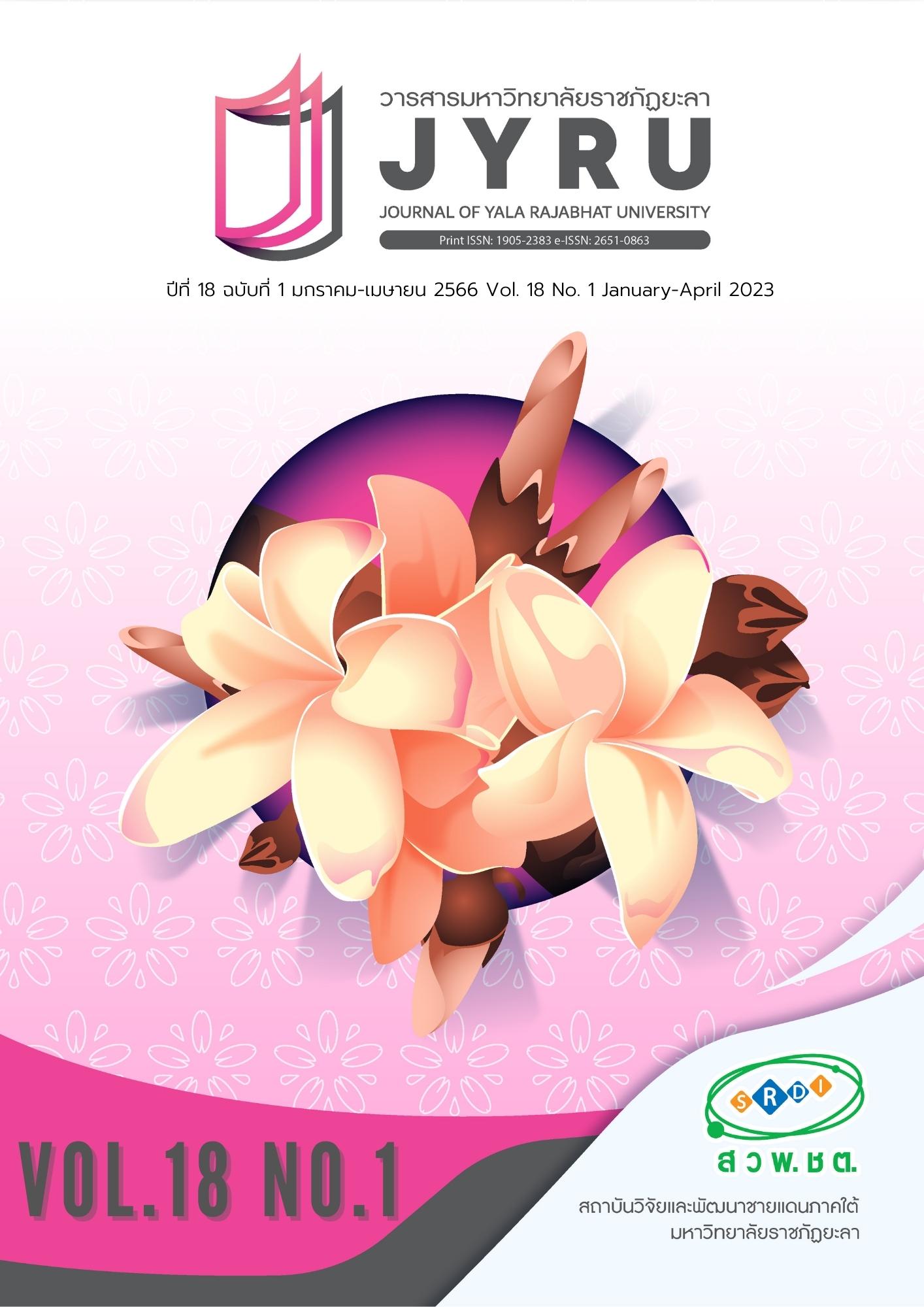การพัฒนารูปแบบการท่องเที่ยวสำหรับการเรียนรู้วิถีเกษตร เพื่อยกระดับศักยภาพการท่องเที่ยวเชิงสร้างสรรค์ในจังหวัดกาญจนบุรี
Main Article Content
บทคัดย่อ
การวิจัยนี้มีวัตถุประสงค์เพื่อการพัฒนารูปแบบการท่องเที่ยวสำหรับการเรียนรู้วิถีเกษตร กิจกรรมการท่องเที่ยว และแนวทางพัฒนาศักยภาพการท่องเที่ยวสำหรับการเรียนรู้วิถีเกษตรเพื่อยกระดับการท่องเที่ยวเชิงสร้างสรรค์ในจังหวัดกาญจนบุรี ดำเนินการวิจัย 3 ขั้นตอน ตอนที่หนึ่ง การพัฒนารูปแบบการท่องเที่ยว ใช้ข้อมูลจากเอกสาร แบบสอบถามการสนทนากลุ่ม และการสัมภาษณ์เชิงลึก จากผู้ให้ข้อมูลหลัก 37 คน การวิเคราะห์ข้อมูลเชิงปริมาณ ใช้สถิติเชิงพรรณนา ส่วนการวิเคราะห์ข้อมูลเชิงคุณภาพใช้การวิเคราะห์เนื้อหา ตอนที่สอง การพัฒนากิจกรรมการท่องเที่ยว ใช้การวิจัยเชิงปฏิบัติการแบบมีส่วนร่วม จากผู้ให้ข้อมูลหลัก 20 คน การวิเคราะห์ข้อมูลเชิงคุณภาพใช้การวิเคราะห์เนื้อหา ตอนที่สาม การวิเคราะห์แนวทางพัฒนาศักยภาพการท่องเที่ยว การสนทนากลุ่ม จากผู้ให้ข้อมูลหลัก 20 คน การวิเคราะห์ข้อมูลเชิงคุณภาพใช้ การวิเคราะห์เนื้อหา ผลการวิจัยพบว่า รูปแบบการท่องเที่ยว มีองค์ประกอบ 6 ด้าน ประกอบด้วย ด้านแหล่งท่องเที่ยว ด้านการบริหารจัดการการท่องเที่ยว ด้านสิ่งดึงดูดใจและกิจกรรมการท่องเที่ยว ด้านบริการการท่องเที่ยว ด้านการตลาดการท่องเที่ยว และด้านการมีส่วนร่วม ส่วนการพัฒนากิจกรรมการท่องเที่ยว 4 กิจกรรม ประกอบด้วย กิจกรรมฐานเรียนรู้ด้านการอนุรักษ์และการใช้ประโยชน์ กิจกรรมฐานเรียนรู้ด้านอาชีพ กิจกรรมฐานเรียนรู้ด้านวัฒนธรรม กิจกรรมฐานเรียนรู้ด้านการฝีมือ และการนำเสนอโปรแกรมการท่องเที่ยวและศึกษาดูงาน สำหรับแนวทางพัฒนาศักยภาพการท่องเที่ยว ประกอบด้วย การเตรียมความพร้อมของบริการขั้นพื้นฐานที่เหมาะสมกับสภาพของพื้นที่ การกำหนดแผนงานและเป้าหมายในการบริหารจัดการการท่องเที่ยว กิจกรรมที่สร้างประสบการณ์ใหม่ที่สอดคล้องกับความต้องการของนักท่องเที่ยว การให้ข้อมูลด้านการท่องเที่ยวและการบริการที่ประทับใจ การประชาสัมพันธ์โดยสื่อสังคมออนไลน์ และการมีส่วนร่วมในการดำเนินงานผ่านเครือข่ายการท่องเที่ยว
Article Details

อนุญาตภายใต้เงื่อนไข Creative Commons Attribution-NonCommercial-NoDerivatives 4.0 International License.
บทความ ข้อมูล เนื้อหา รูปภาพ ฯลฯ ที่ได้รับการเผยแพร่ในวารสารมหาวิทยาลัยราชภัฏยะลานี้ ถือเป็นลิขสิทธิ์ของวารสารมหาวิทยาลัยราชภัฏยะลา หากบุคคลหรือหน่วยงานใดต้องการนำทั้งหมดหรือส่วนหนึ่งส่วนใดไปเผยแพร่ต่อหรือกระทำการใดๆ จะต้องได้รับอนุญาตเป็นลายลักษณ์อักษรจากวารสารมหาวิทยาลัยราชภัฏยะลาก่อนเท่านั้น
เอกสารอ้างอิง
Boonpaisarnsathit, N., Amataphon, T. & Pakhongsup, P. (2020). Niche market development guidelines for community-based tourism social enterprises in Thailand: Case studies of Thai Localist and North Andaman network foundation. Bangkok: Thailand Science Research and Innovation. (in Thai)
Chantaranamchoo, N. (2020). Development education: Diversity of paradigms for sustainable development. Bangkok: Wattanapanich. (in Thai)
Esichaikul, R. & Chansawang, C. (2015). Development of agrotourism of Thailand for ASEAN tourists. Bangkok: National Research Commission and Office of Research Support Fund. (in Thai)
Laophuangsak, P. (2016). Guideline for religion tourism development for supporting retirement community tourist in Kanchanaburi. Journal of Humanities and Social Sciences Thonburi University, 10(21), 35-43. (in Thai).
Lee, T. H. & Jan, F. H. (2019). Can community-based tourism contribute to sustainable development? Evidence from residents’ perceptions of the sustainability. Tourism Manage, 70(February), 368-380.
Lu, H. & Qingwen, M. (2013). The role of multi-functionality of agriculture in sustainable tourism development in globally important agricultural heritage systems (GIAHS) sites in China. Journal of Resources and Ecology, 4(3), 250-257.
Ministry of Tourism and Sport. (2017). Creative tourism destination management. Bangkok: Department of Tourism. (in Thai)
Office of Tourism and Sports Kanchanaburi Province. (2016). Strategic plan for tourism in Kanchanaburi Province 2016. Kanchanaburi: Office of Tourism and Sports. (in Thai)
Office of Tourism Development. (2012). Agritourism Quality Standards Assessment Guide. Bangkok: Office of the War Veterans Organization. (in Thai)
Petroman, L., VargaElena, M., Constantin E. C., Petroman, C., Momir ,B., Turc, B. & Merce, L. (2015). Agritourism: An educational tool for the students with agro-food profile, 3rd Glolbal Conference on Business, Economics, Management and Toursim, 26-28 November 2015, Rome: Italy.
Phakdeephinit, P., Limphanitkul, T., Phongphatanasira, S. & Thawiphet, P. (2017). The study of tourism potential of Keang Pha Di and related areas. Bangkok: Office of Research Support Fund. (in Thai)
Pitchayadejanant, K. & Nakpathom, P. (2018). Data mining approach for arranging and clustering the agro- tourism activities in orchard 2018, Kasetsart Journal of Social Sciences, 39(2018), 407-413.
Richards, G. (2010). Creative tourism and local development. In R. Wurzburger. (Ed.). Creative tourism: A global conversation how to provide unique creative experiences for travelers worldwide. Presented at the 2008. Santa Fe & UNESCO international conference on creative tourism in Santa Fe, New Mexico, USA. Santa Fe: Sunstone Press.
Sesotyaningtyas, M. & Manaf, A (2014). Analysis of sustainable tourism village development at Kutoharjo village, Kendal Regency of Central Java. 5th Arte Polis International Conference and Workshop Reflections on Creativity: Public Engagement and The Making of Place, Arte-Polis 5, 8-9 August 2014, Bandung: Indonesia.
Silparcha, W. & Songsoonthornwong, C. (2015). Development of community enterprise mechanism of agrotourism for ASEAN tourists. Bangkok: National Research Commission and Office of Research Support Fund. (in Thai)
Teeranon, S. & Sophonjarasgool, P. (2016). Creative tourism: Choice survival of tourism in Thailand. Pathumthani University Academic Journal, 8(2), 216-225. (in Thai)
UNESCO. (2006). Towards sustainable strategies for creative tourism. Discussion report of the planning meeting for 2008. International Conference on Creative Tourism, Santa Fe, New Mexico, USA, October. 25-27, 2006.
Wang, L. en., Cheng, S. kui., Zhong, L. sheng., Mu, S. lin., Dhruba, B. G. C., & Ren, G. zhu. (2013). Rural tourism development in China: Principles, models and the future. Journal of Mountain Science, 10(1), 116-129.


